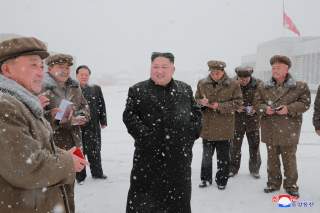The Hanoi Summit – We Asked Katharine Moon What Happens Next in U.S.-North Korea Relations
"The collapse of the Hanoi Summit is the best thing that could have happened for U.S. – DPRK diplomacy."
Editor’s Note: Looking for more opinions on where we go after the Hanoi summit? Check out all 80 expert takes on where U.S-North Korea relations go next here.
The collapse of the Hanoi Summit is the best thing that could have happened for U.S.–North Korean diplomacy. Rather than an end, it signaled the start of substantive negotiations to come. There were important lessons: First, president Donald Trump’s self-designated “charm offensive” cannot denuclearize North Korea. Second, Pyongyang will be slow to give up nuclear assets and knows how to drive a hard bargain. Facts serve as a better foundation than hype about the two leaders’ beautiful friendship. Third, real negotiations require working-level counterparts that pursue respective and mutual interests and doggedly endure the ups and downs of diplomacy. Fourth, Washington and Pyongyang will have to look each other in the eye rather than look askance at Seoul to mediate and translate intentions and interests. Fifth, the remainder of 2019 is a contained time period in which the two sides can either make or break their engagement. For instance, come 2020, election fever will take over the Trump administration with little bandwidth for painstaking diplomacy.
The best evidence for future diplomacy lies in the Democratic People’s Republic of Korea (DPRK) state media. Before, during, and after the meeting in Vietnam, North Korean news outlets (in the Korean language) focused on optimistic depictions of the summit. They emphasized great “progress” in the bilateral relationship since 2018. Upon North Korean leader Kim Jong-un’s return on March 5, the Korea Central News Agency continued to mention that the second summit had been “successful,” a refrain that has been consistent since the breakdown of the Hanoi dialogue. Kim and his ruling elite are invested in communicating that diplomacy with the United States is in good shape, which signals continuation on that path. Only on March 8 has the state media tossed out mild expressions of “regret” by the “public at home and abroad that had hoped for success and good results from the second DPRK-U.S. summit.” This is hardly a criticism from an outlet habituated to lambasting the United States with vitriol.
Even though Kim did not get sanctions relief through Hanoi, he will continue to seek outlets for economic development in his country. This is the “new strategic line” that he professed to his people in 2018. Without reconstructing the economy, Kim will not have a country to rule over. As much as creating a potent nuclear state has framed his political legitimacy and heightened the people’s national pride since his assumption of power in late 2011, Kim’s future depends on improving the daily economic livelihood for the majority of North Koreans who struggle to eke out a living. The economic imperative will keep North Korea at the negotiating table as long as Washington understands what drives Pyongyang toward engagement. Pyongyang will proceed down the diplomatic path with suspicion and caution, using its nuclear asset as leverage, but its days of belligerent isolation are fading fast.
This does not mean that North Korea will turn kinder and gentler. Even though it seems to be restoring the Sohae satellite launch facility toward full operability, it is unlikely that Kim will go back on his word to maintain the self-imposed moratorium on nuclear and missile tests as long as Washington is inclined toward dialogue. But other provocative measures are more likely: low-grade cyber attacks on South Korea and Japan, demonstrations of cozying up to Beijing and Moscow, and slowing or partially reversing some of the new military cooperation with Seoul. Such activities should be construed in the context of a negotiating stance begun in Hanoi, not a return to status quo ante. So far, the Trump administration appears committed to continuing the dialogue.
Katharine Moon is a professor of Political Science and the Wasserman Chair of Asian Studies at Wellesley College. She is also a nonresident senior fellow at The Brookings Institution Center for East Asia Policy. You can follow her on Twitter at @KathyHSMoon.
Image: Reuters

